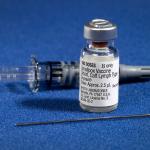Ever since the coronavirus crept onto the world stage, we have been suffering from two simultaneous pandemics: One from the virus and another from mis- and disinformation.
COVID-19
Andrew Wakefield is the disgraced former doctor who was kicked off the UK's medical register following his fraudulent research that claimed a link between the MMR vaccine and autism.
Vaccination of high-risk groups against SARS-CoV-2, the virus that causes COVID-19, has begun in earnest – and not a moment too soon because the trends in the United States are moving in the wrong direction.
There are two ways to become immune against an infectious disease: The not-so-fun way and the really-not-so-fun way.
By Maitreyi Shivkumar, De Montfort University
Those of us in Washington State who were hoping that 2021 would bring some respite from the massive disruption to our daily lives will have to wait.
This article was originally published at Geopolitical Futures. The original is here.
One of the main reasons that the coronavirus pandemic is so difficult to stop is because of the high prevalence of asymptomatic carriers. These are people who are infected with the virus and show no symptoms, yet can spread the virus to others.
Over the past several days, the world has received monumentally good news: Vaccines exist against the coronavirus, and they are effective. Even better, vaccines are being developed by multiple companies.
When the COVID pandemic first emerged, Dr. Anthony Fauci said that he hoped people would permanently stop shaking hands.












